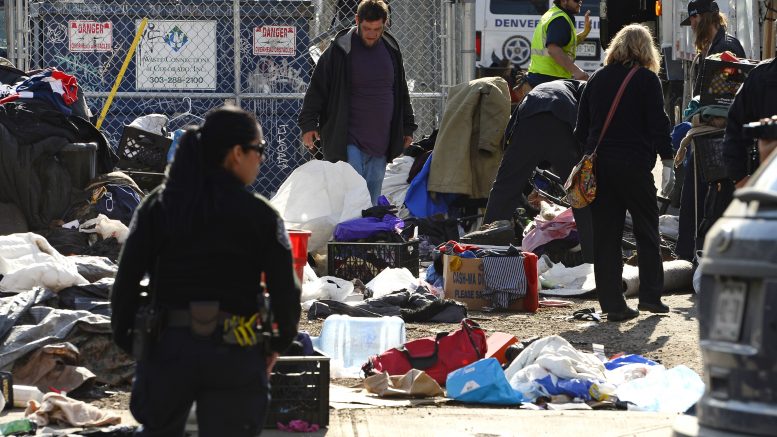Homelessness may be the most difficult issue these days for municipal government, at least in big cities like Denver. Every conceivable policy is controversial and denounced as inhumane or, alternatively, as an affront to neighborhoods and the safety and image of commercial districts.
Denver has tried to thread the needle by offering a broad spectrum of services on which the city says it spends $50 million a year while drawing the line at allowing the homeless to camp on streets and sidewalks and in parks. It’s a defensible policy, whatever the flaws occasionally in execution, and we hope it survives a legal challenge in the form of a class-action lawsuit filed last week.
If it doesn’t, the homeless problem in Denver is likely to get a good deal worse.
The lawsuit claims the city’s policies involve the “systematic evisceration of thousands of displaced persons’ constitutional rights in order to clear the way for new housing and development.” It also recklessly compares the treatment of the homeless to that of blacks in the South in the era of Jim Crow.
Anyone who has spent time in or near downtown in recent years will react with wonder at the lawsuit’s claim that Denver’s ban on unauthorized camping in 2012 has meant that “any persons who might appear poor or displaced were now prohibited from existing in the downtown Denver area.” The same goes for the related assertion that any homeless person who sits down is immediately told to “get up and move.” That clearly is not the case.
It is true, however, that Denver resolved with the passage of the camping ban not to allow groups of homeless to obstruct public streets, sidewalks and alleys, which by the way has been against the law for decades. And Mayor Michael Hancock’s administration has also apparently decided it will not allow encampments of homeless to take root and grow on the basis of their health and safety risks, which are real.
Such policies are reasonable if — and the caveat is important — the city offers the homeless options for shelter elsewhere. When the city dispersed a homeless encampment near Samaritan House in March, for example, officials assured us they acted only when it was clear there was room in shelters for all.
The lawsuit directly disputes that claim, insisting beds were not available. Whose version is accurate? The answer is critical.
Perhaps equally important is the truth regarding how the city handles personal property it confiscates from the homeless and holds for retrieval when it disperses encampments. The lawsuit claims the city routinely throws out not only trash but items of value to the owners — which obviously should not be the case. They have as much right to their property as someone from any other stratum of society.
But even if Denver has been heavy-handed at times, as the lawsuit alleges — and that remains to be established — it’s important that the courts appreciate the importance of a city being able to say no to homeless encampments. Whatever the courts decide, they should stop short of establishing a right to camp on city property. That would amount to a radical departure in public policy that would undermine the city’s ability to nurture a safe and attractive environment for all of its citizens.
Editor: The views, opinions and positions expressed within articles by the authors and those providing comments on these blogs are theirs alone, and do not necessarily reflect the views, opinions or positions of ClassActionReview.com. Please review our TOS for additional details. Please visit the source link below to comment on this article.
Source: www.denverpost.com





Be the first to comment on "Op-Ed: Lawsuit Targeting Denver’s Homeless Policies Is Off-Base and Reckless"